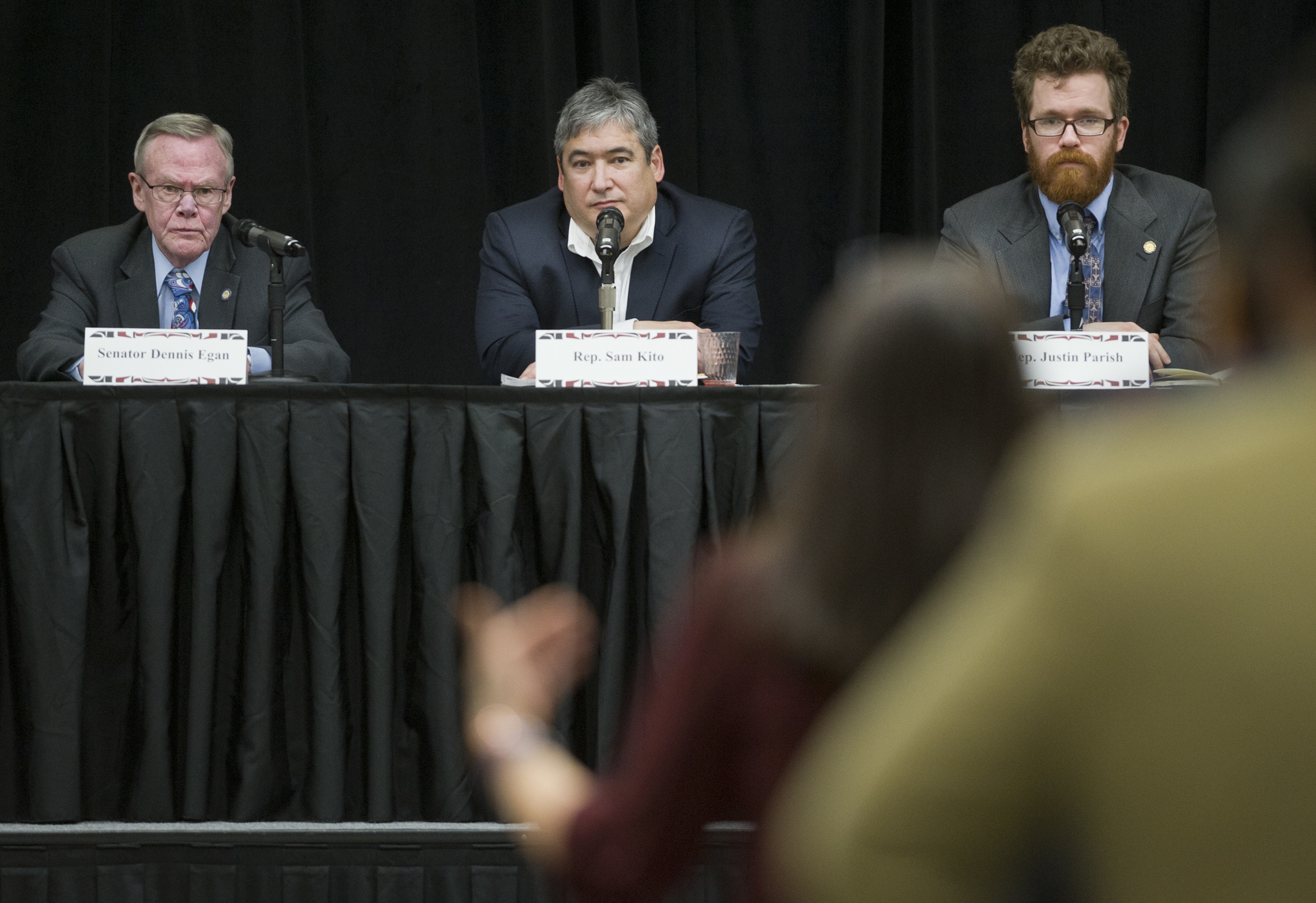Juneau’s new all-Democratic legislative delegation made its first appearance before the Native Issues Forum Thursday, and its members said they’d use their newfound clout to protect Juneau.
That includes threats to move the capital, Juneau’s long-time boogeyman, to more likely and similarly damaging cuts to the city’s number one industry: government.
Newly elected Rep. Justin Parish, from Juneau’s valley district, said he’d use his key position as co-chair of the House Community and Regional Affairs Committee to prevent any capital move bills from advancing in the House.
“I have it within my power to kill any capital move legislation that comes before me,” Parish said.
Parish, along with Rep. Sam Kito, representing Juneau’s downtown district, are members of the Democratic-led House Majority Caucus that named as speaker Rep. Bryce Edgmon, D-Dillingham.
But while the audience at the Central Council of Tlingit and Haida Indian Tribes of Alaska-sponsored forum cheered what they heard from Parish, he also warned that the slow loss of jobs could be nearly as damaging.
“If Juneau isn’t getting its head cut off, we’re slowly being bled dry by the movement of state jobs from Juneau to Anchorage,” he said. Parish warned that there now appear to be only three commissioners, the state’s top department heads, who are based in Juneau.
While Juneau faces special threats due to its status as the capital and its high concentration of state employees, the state’s tight finances mean every community may face cuts to schools and other state-funded services.
“The goal is to keep education funding steady,” he said, while emphasizing proven programs like Head Start.
Rep. Kito said he’d be using his position as chair of the House Labor and Commerce Committee to protect Juneau jobs as well, including a proposal to contract out engineering jobs now done by state employees in the Department of Transportation.
“I do believe that we’ve slowed that down a bit,” he said.
Kito, an engineer himself, said he’s looking for evidence that such a change would be better for the state. Kito said he’s also worried about losing highly efficient state employees who have help make Alaska one of the top beneficiaries of federal transportation dollars by never having to return unused money and always having projects ready to go when there are federal dollars available.
Kito will also chair the Legislative Council, which he said functions as a board of directors for the Legislature, and is internally one of its most important committees.
That body is now dealing with the fallout of controversies such as spendy renovation of the Anchorage Legislative Information Office and then purchase of a new LIO that may need further renovations, as well as policies such as how much legislators cans spend on travel and relocation.
“I inherited that circumstance,” Kito said.
Forum audience member Dennis Harris suggested the Legislature could save money by “not buying expensive buildings in a town that’s not the capital.”
Kito warned that the newest building purchased to be offices for Anchorage legislators may need additional work, and that could wind up triggering even more work such as compliance with the Americans with Disabilities Act.
But Kito said he’d be looking at both the travel policies and buildings as chair of council made up of both House and Senate members.
“As an engineer, I love digging into details,” he said.
Sen. Dennis Egan, Juneau’s lone senator, said he shared Kito’s “deep concerns about outsourcing design engineers out of Southeast,” and that protecting local jobs would be a top priority.
He’s also looking to protect the environment as well, and said that just as Alaska got British Columbia Minister of Mines Bill Bennett educated on local concerns about upriver Canadian mines, Benett had announced his retirement.
That comes after Lt. Gov. Byron Mallott helped convince Bennett of the need for a cleanup of the Tulsequah Chief mine, which is leaking acidic drainage into the Taku River that flows to Juneau.
“Byron got him educated,” Egan said, and now Bennett is retiring. That will involve more action by the state to keep momentum for a cleanup going in Canada, he said, possibly with federal involvement in both the U.S. and Canada.
Egan said he’s also concerned about a proposal to privatize the Alaska Marine Highway System, possibly following the model of the Alaska Railroad
“I think it’s an interesting concept, but I’m not fully convinced about it,” Egan said.
Egan said the Senate Transportation Committee, on which he sits, is chaired by Sen. Bert Stedman, R-Sitka, a fellow Southeasterner who knows how important ferries are to coastal Alaska.
But while all the members of the Juneau delegation said they’d work to protect vital programs from cuts, the state also faces significant financial challenges that may not make that possible.
“I can’t help but think that we’re sitting on the Titanic and heading north,” warned audience member Ben Coronell.
Members of the delegation said the state was going to have to look for new revenues, with Kito saying he favored an income tax over a sales tax because it would tax people who work in Alaska but live elsewhere, while a sales tax would hit low-income Alaskans hardest.
Rep. Parish said that a recent review of oil tax legislation “about knocked my socks off” when he learned from the Walker administration that the state would have been $10 billion poorer had Senate Bill 21 been passed earlier.
That shows that oil tax credits need to be addressed by the Legislature this year, Parish said.
But Egan warned that no matter what happens, more cuts are coming.
“We have to make sure that Juneau gets treated fairly and correctly,” he said.

